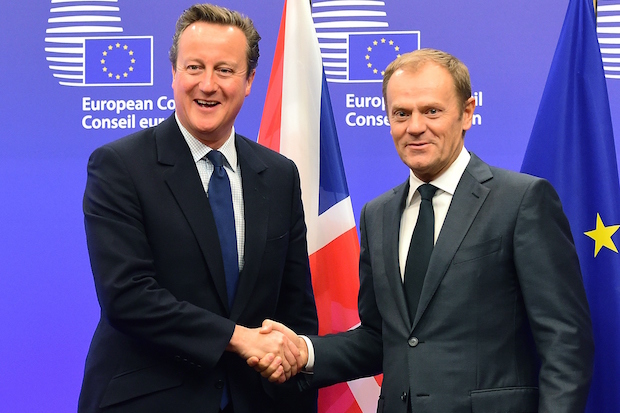Downing Street has released the long-awaited letter from the Prime Minister to Donald Tusk, president of the European Council — outlining the four areas in which he would like to negotiate a new settlement for Britain. Here are the key parts of the letter, outlining the areas David Cameron is keen to reform:
1. Economic governance
‘What we seek are legally binding principles that safeguard the operation of the Union for all 28 Member States — and a safeguard mechanism to ensure these principles are respected and enforced. These principles should include recognition that:
- The EU has more than one currency.
- There should be no discrimination and no disadvantage for any business on the basis of the currency of their country.
- The integrity of the Single Market must be protected.
- Any changes the Eurozone decides to make, such as the creation of a banking union, must be voluntary for non-Euro countries, never compulsory.
- Taxpayers in non-Euro countries should never be financially liable for operations to support the Eurozone as a currency.
- Just as financial stability and supervision has become a key area of competence for Eurozone institutions like the ECB, so financial stability and supervision is a key area of competence for national institutions like the Bank of England for non-Euro members.
- And any issues that affect all Member States must be discussed and decided by all Member States.’
2. Competitiveness
‘But with the best will in the world, we would all acknowledge that the EU can go much further. In particular, for all we have achieved in stemming the flow of new regulations, the burden from existing regulation is still too high. So the United Kingdom would like to see a target to cut the total burden on business.
‘The EU should also do more to fulfil its commitment to the free flow of capital, goods and services. The United Kingdom believes we should bring together all the different proposals, promises and agreements on the Single Market, on trade, and on cutting regulation into a clear long-term commitment to boost the competitiveness and productivity of the European Union and to drive growth and jobs for all.’
3. Sovereignty
‘First, I want to end Britain’s obligation to work towards an “ever closer union” as set out in the Treaty. It is very important to make clear that this commitment will no longer apply to the United Kingdom. I want to do this in a formal, legally-binding and irreversible way.
‘Second, while the European Parliament plays an important role, I want too enhance the role of national parliaments, by proposing a new arrangement where groups of national parliaments, acting together, can stop unwanted legislative proposals. The precise threshold of national parliaments required will be a matter for the negotiation.
‘Third, I want to see the EU’s commitments to subsidiarity fully implemented with clear proposals to achieve that. As the Dutch have said, the ambition should be “Europe where necessary, national where possible”.’
4. Immigration
‘Britain has always been an open, trading nation, and we do not want to change that. But we do want to find arrangements to allow a Member State like the UK to restore a sense of fairness to our immigration system and to reduce the current very high level of population flows from within the EU into the UK. These have been unplanned and are much higher than forecast — far higher than anything the EU’s founding fathers ever envisaged.’
…
‘As I have said previously, we can reduce the flow of people coming from within the EU by reducing the draw that our welfare system can exert across Europe. So we have proposed that people coming to Britain from the EU must live here and contribute for four years before they qualify for in-work benefits or social housing. And that we should end the practice of sending child benefit overseas.’
You can read the full letter here:






Comments